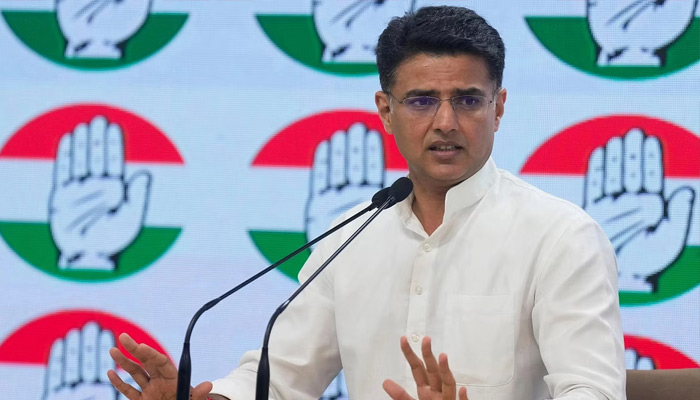The Congress on Monday promised to scrap Agnipath and reintroduce the old system of armed services recruitment if voted back to power.
Hours after the party chief, Mallikarjun Kharge, wrote to President Droupadi Murmu reiterating concerns over the new scheme, which cuts tenure and offers fewer service benefits.
Enrolments under the Agnipath scheme commenced in 2022 despite protests. Agnipath is designed to bring more people into the armed forces on four-year contracts to lower the average age of the military.
“Our defence expenditure is increasing…it was recently said that we are earning a lot of money through defence exports…that we are becoming independent and doing indigenous manufacturing. If our defence department is generating so much income, and we are becoming so capable, then the most important thing would be to make resources available for the jobs, recruitment, and families of our brave soldiers available,” said Congress leader Sachin Pilot at a press conference he addressed jointly with member of Parliament Deepender Hooda.
Pilot cited Kharge’s letter and slammed the Agnipath scheme as merely a “politicised” cost-cutting measure. He alleged that the government has “weakened” the army.
Pilot questioned if the government could spend ₹4100 crore on the G-20 summit, ₹4800 crore on the Prime Minister’s plane, ₹20,000 crore on the Central Vista project, and ₹6500 crore on advertisements, then messing around with the process of recruitment to save money can become a challenge for India’s security and integrity.
Hooda said there was “no demand” from the army, its leadership, the youth, or any political party to bring the Agnipath scheme. Hooda added there has been a decline in army recruitment from an average of 60-65,000 per year to 45,000 Agniveer recruits in the past year. “If the recruitment numbers continue to fall at this rate, our army of 1.4 million will reduce to 800,000 within 10 years,” he said.
He added that rather than fulfilling the election promise of “One Rank, One Pension”, the government implemented a “No Rank, No Pension” system. He slammed Bharatiya Janata Party (BJP) leader Kailash Vijayvargiya for saying Agniveers would be given jobs as security guards at their offices.
“The first adverse effect of this scheme would be that soldiers would return home after four years without a pension. Where will he go? In response, Vijayvargiya said that such youths would be given jobs as security guards at BJP offices.”
He said once youths would go to the borders and defend the country by putting their lives at risk. “Today, they are forced to go the Dunki route, illegally immigrating…and working as labourers,” Hooda said.
Earlier, Kharge in his letter to Murmu highlighted the injustice to almost 200,000 young men and women. He said their future has become uncertain due to the introduction of the new recruitment process. “Recently I met them and they told me that between 2019 and 2022, almost two lakh [200,000] young men and women were informed that they had been accepted into the three armed services: the Indian Army, the Indian Navy, and the Indian Air Force,” he wrote.
Kharge added these young men and women struggled against odds to pass gruelling mental and physical tests and a written exam. “Until 31 May 2022, they believed that they had fulfilled their dreams and were awaiting only their joining letters. On that day, their dreams were shattered by the Government of India’s decision to end this recruitment process and replace it with the Agnipath Scheme.”
He added there are many well-known issues with the Agnipath scheme. “Former Chief of Army Staff General MM Naravane has written that the Army was ‘taken by surprise’ by Agnipath and that ‘for the Navy and Air Force, it came like a bolt from the blue’.”
Kharge said the scheme is discriminatory as it creates parallel cadres of soldiers expected to do similar tasks but with very different emoluments, benefits, and prospects. “The majority of Agniveers will be released into an uncertain job market after four years of service, which some have argued could affect social stability,” he wrote.
“Not only did they spend years in pursuit of this dream, but the 250 each 50 lakh [five million] applicants had to pay to collect an application form was never refunded, which amounts to a hefty 125 crore… The resulting frustration and hopelessness has even led to several reported deaths by suicide.”

